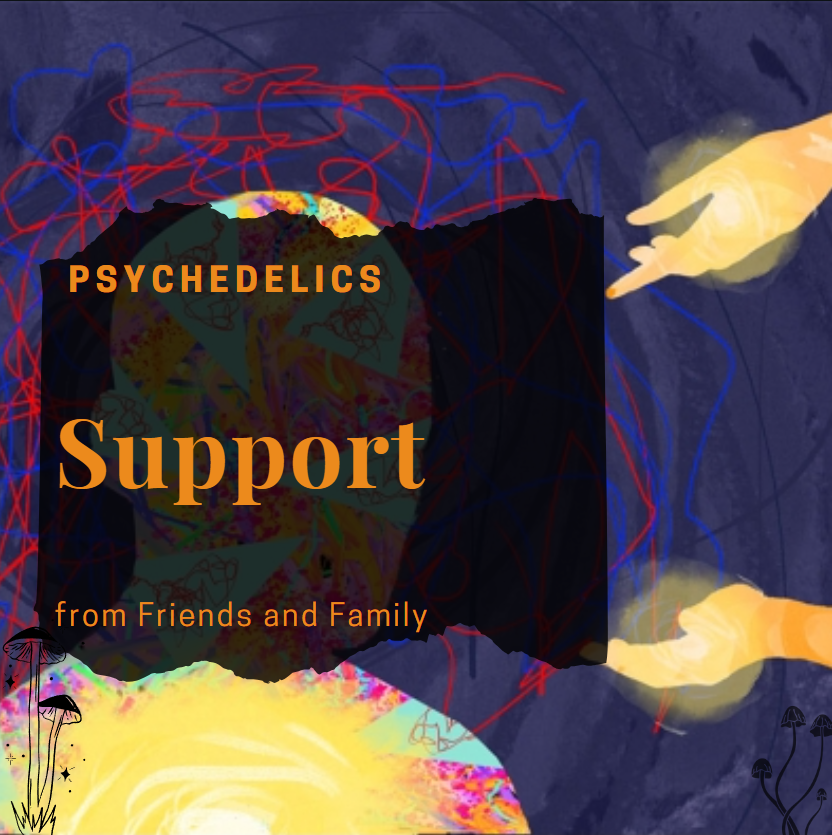
Educate Yourself First: Inner Support Discovery
Before seeking external assistance from friends and family, especially for psychedelic therapy, focus on self-support to foster confidence and determination.
Begin by enhancing your understanding of the topic. Are you projecting confidence in your choice to explore therapeutic psychedelics?
Remember, the decision to pursue psychedelic therapy is deeply personal, and not everyone may immediately grasp or endorse it.
Yet, armed with knowledge and inner resilience, you can authentically convey your intentions and underscore the significance of this journey for your well-being.
Delve into your motivations, expectations, and readiness for psychedelic therapy. Reflect on why you are drawn to this approach and what outcomes you anticipate.
Nurture self-trust and conviction in your decision, crucial for navigating uncertainties and obstacles.
This groundwork empowers you to engage with friends and family from a place of informed understanding and personal conviction.
Having The Conversation: 7 Steps to Seeking Support
Cultivate Patience, Compassion & Openness
Demonstrate patience, compassion, and openness when discussing psychedelic therapy. These qualities foster understanding and sustain healthy relationships.
By being receptive to differing viewpoints and engaging in thoughtful dialogue, you demonstrate respect for others’ perspectives and affirm the importance of their input.
Patience, compassion, and openness enable mutual respect and attentive listening, vital for meaningful conversations.
Choose the Right Moment and Setting
Select an appropriate time and environment conducive to a respectful conversation. It’s beneficial to schedule a discussion in advance to allow emotional preparation.
This proactive approach signals the importance of the conversation to your loved ones, fostering an environment of mutual respect and openness.
Opt for a comfortable and private setting that encourages intimacy and trust, facilitating an open and uninterrupted exchange.
Be Transparent about Your Needs
Express honesty, sincerity, and openness regarding your motivations and intentions behind pursuing psychedelic therapy.
Share your thoughts, emotions, and personal journey that led to this decision, emphasizing your aspirations for personal growth and healing.
Communicate your intention to approach the experience responsibly and seek guidance. Authenticity and transparency underscore your commitment to well-being.
Provide Information and Resources
Offer resources to address any concerns or doubts your loved ones may harbor.
Address Concerns and Misconceptions
Listen attentively to apprehensions and queries, responding empathetically and with understanding.
Clarify any misconceptions by providing accurate information and dispelling false assumptions.
Offer insights into therapeutic protocols, safety measures, and the presence of trained professionals to assuage concerns and build trust.
Navigate Resistance with Empathy
Manage resistance or unsupportive reactions with patience and empathy.
Acknowledge their concerns as stemming from a place of care and protectiveness, responding with understanding rather than defensiveness.
Share your experiences, research, and reputable resources to address their concerns while maintaining open communication and personal boundaries.
Emphasize the Potential Benefits
Highlight the potential benefits of psychedelic therapy for personal growth, mental well-being, and interpersonal relationships.
Finding Support Beyond Family & Friends
In addition to familial and social networks, explore other avenues of support integral to your healing journey.
Healthcare providers experienced in psychedelic medicine offer medical expertise and guidance on physical health considerations, ensuring holistic support throughout the process.
Therapists and counselors provide therapeutic insights and tools for integration, aiding in processing and exploring experiences.
Psychedelic facilitators offer professional support during the psychedelic experience, fostering a safe and transformative journey.
Their expertise in creating a conducive environment, establishing trust, and ensuring safety enhances the therapeutic process, providing reassurance and guidance.
This holistic, complete approach ensures that you go into your experience feeling adequately prepared—mentally, physically, and practically—as well as leave the experience feeling continually supported.
Lastly, support groups and communities can also be invaluable sources of support. Engaging with like-minded individuals in these groups provides a sense of belonging, understanding, and shared experiences.
Support groups offer a space to share, learn from others, and gain additional resources for personal growth and integration. Being part of a community that embraces and explores psychedelic therapy can provide ongoing support and validation throughout your journey.
By incorporating the support of these various professionals, you create a multidimensional framework for healing, growth, and integration.
Collaboration between family, friends, medical professionals, therapists, facilitators, and support networks forms a robust support system that guides you on your transformative path.
Remember to research and choose professionals who have experience and expertise in psychedelics (or are at least somewhat open to their benefits), ensuring you receive the most appropriate and knowledgeable support for your journey.
Ready to Find The Right Psychedelic Guide For You?
We hope this article helps you navigate the complexity of finding support while journeying with psychedelics in a therapeutic context.
